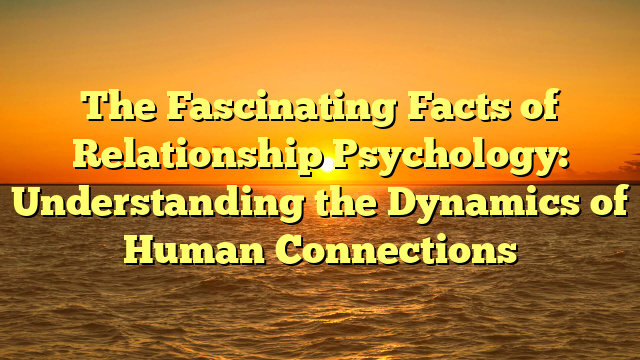The Fascinating Facts of Relationship Psychology: Understanding the Dynamics of Human Connections
The Fascinating Facts of Relationship Psychology: Understanding the Dynamics of Human Connections
Introduction
Relationships are an integral part of human life. Whether it’s a romantic partnership, a friendship, or a familial bond, understanding the dynamics of human connections is crucial for maintaining healthy relationships. Relationship psychology delves into the intricacies of how individuals interact with one another, providing valuable insights into the complexities of human behavior.
The Science Behind Relationships
Relationship psychology is a branch of psychology that focuses on studying the dynamics of interpersonal relationships. It explores various aspects such as attraction, communication, conflict resolution, and attachment styles. By understanding the science behind relationships, we can gain a deeper understanding of why we behave the way we do in our interactions with others.
Attraction
Attraction is a fundamental aspect of relationships. It is the initial spark that draws individuals towards one another. Relationship psychology explains that attraction can be influenced by various factors, including physical appearance, personality traits, and shared interests. Additionally, research suggests that proximity plays a significant role in attraction, as individuals are more likely to form relationships with those they frequently encounter.
Communication
Effective communication is essential for building and maintaining healthy relationships. Relationship psychology emphasizes the importance of both verbal and non-verbal communication. Verbal communication involves the use of words to express thoughts, feelings, and needs. Non-verbal communication, on the other hand, includes body language, facial expressions, and tone of voice. Understanding and improving communication skills can help individuals navigate conflicts, express emotions, and foster deeper connections.
Conflict Resolution
Conflicts are inevitable in any relationship. However, how individuals handle conflicts can significantly impact the overall health of the relationship. Relationship psychology provides strategies for resolving conflicts in a constructive manner. These strategies include active listening, empathy, compromise, and finding common ground. By learning effective conflict resolution techniques, individuals can strengthen their relationships and prevent long-term damage.
Attachment Styles
Attachment theory is a cornerstone of relationship psychology. It explores how individuals form emotional bonds with others, particularly in early childhood. According to attachment theory, individuals develop specific attachment styles based on their early experiences with caregivers. These attachment styles, such as secure, anxious, or avoidant, influence how individuals approach and navigate relationships throughout their lives. Understanding attachment styles can help individuals recognize patterns in their relationships and work towards developing healthier attachment patterns.
Fascinating Facts about Relationship Psychology
Now that we have explored the basics of relationship psychology, let’s delve into some fascinating facts about this field:
- Relationships can have a significant impact on physical health. Research suggests that individuals in healthy, supportive relationships tend to have lower stress levels, better cardiovascular health, and a longer lifespan.
- Love and attraction activate similar brain regions. Studies using functional magnetic resonance imaging (fMRI) have shown that the brain regions associated with romantic love and attraction overlap, indicating the strong connection between these two phenomena.
- Relationship satisfaction tends to decline after the initial honeymoon phase. This decline, often referred to as the “honeymoon phase effect,” is a common phenomenon observed in many relationships. However, with effort and commitment, couples can navigate this phase and build a deeper, more fulfilling connection.
- Relationships can positively impact mental health. Strong social connections have been linked to lower rates of depression, anxiety, and other mental health disorders. Having a support system can provide emotional validation, reduce feelings of loneliness, and enhance overall well-being.
- Relationships can influence personal growth. Interacting with others allows individuals to gain new perspectives, challenge their beliefs, and learn more about themselves. Healthy relationships provide a safe space for personal growth and self-discovery.
Tables: Relationship Psychology Theories
| Theory | Description |
|---|---|
| Attachment Theory | Explores how early childhood experiences shape attachment styles and influence adult relationships. |
| Social Exchange Theory | Suggests that individuals engage in relationships based on a cost-benefit analysis, seeking to maximize rewards and minimize costs. |
| Interdependence Theory | Examines how individuals’ outcomes in relationships are influenced by their level of dependence on one another. |
| Self-Disclosure Theory | Focuses on how individuals reveal personal information to others, fostering trust and intimacy in relationships. |
Conclusion
Relationship psychology offers valuable insights into the dynamics of human connections. By understanding the science behind relationships, individuals can navigate their interactions more effectively, build healthier bonds, and experience greater satisfaction in their relationships. From attraction to conflict resolution and attachment styles, relationship psychology provides a comprehensive framework for understanding and improving relationships. So, let’s delve deeper into this fascinating field and unlock the secrets to successful human connections.

